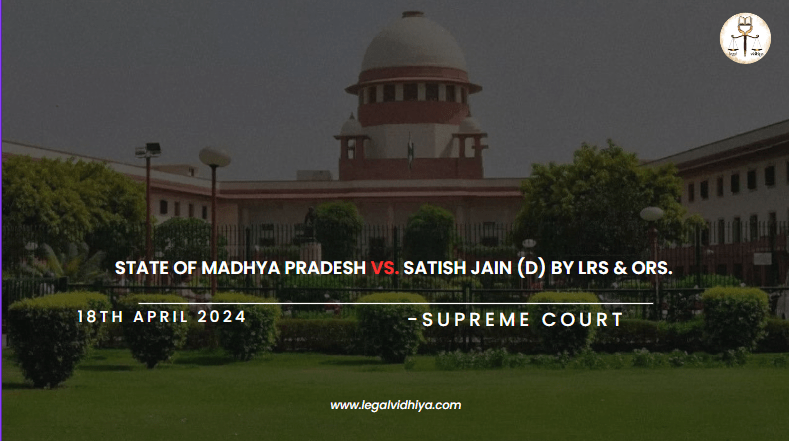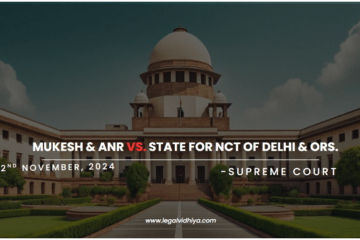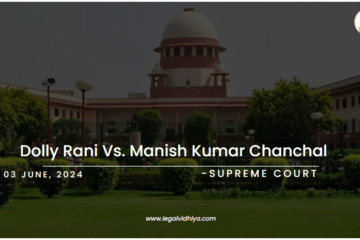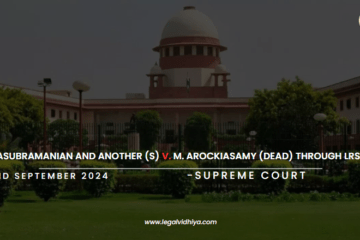
| CITATION | 2024 INSC 315 |
| DATE OF JUDGMENT | 18th April 2024 |
| COURT | Supreme Court of India |
| APPELLANT | The State of Madhya Pradesh |
| RESPONDENT | Satish Jain (D) by Lrs & Ors. |
| BENCH | Vikram Nath, K.V. Viswanathan, JJ. |
INTRODUCTION
This case deals with a land dispute between the State of Madhya Pradesh, Satish Jain (the deceased but represented by his legal heirs), and the Bhopal Municipal Corporation. In his civil suit, Satish Jain sought a declaration of title on the basis of adverse possession and averred that the State had attempted to dismantle his fencing. While the Trial Court first passed the suit ex-parte in favor of Jain, the State’s appeal further sent the matter back for retrial. On the other hand, BMC signed an agreement with Jain in which he was offered other plots of land in exchange for the release of the disputed land for the construction of a bus stand. The State raised this agreement as a basis to challenge the award given by the arbitrator and the High Court upheld the award in favor of the plaintiff but the Supreme Court set aside this order and ordered the Trial Court to proceed with the suit on merits.
FACTS OF THE CASE
- Satish Jain filed a civil suit against Rama and the State of Madhya Pradesh, claiming ownership of a 3.53-acre land through adverse possession by Rama, whose rights were allegedly transferred to Jain.
- The Trial Court initially decreed the suit ex-parte in favor of Jain, but the State’s appeal led to the matter being remanded for a fresh trial.
- Meanwhile, the Bhopal Municipal Corporation (BMC) entered into an agreement with Jain on 30.07.1991, wherein Jain would vacate the land for a bus stand, and BMC would allot him separate plots.
- On the basis of this agreement, the Trial Court referred the matter to an arbitrator who in his said award ordered Jain to pay BMC Rs. 30 lakhs and lease rent for the allotment of the plots.
- Thus, the State disagreed with the award of the arbitrator, as the land was the State property, and after the ex-parte decree was recalled, the agreement ceased to be valid.
- The order of the High Court which affirmed the award of the arbitrator was set aside by the Supreme Court and it further held that the Trial Court shall proceed in the matter in an appropriate manner.
ISSUES RAISED
- Was the agreement dated 30.07.1991 between the plaintiff and BMC valid after the ex-parte decree in the plaintiff’s favor was set aside?
- Did BMC have the legal authority to enter into the agreement with the plaintiff regarding the State-owned land?
- Was BMC’s application under Section 89 CPC for referral to arbitration based on the agreement maintainable?
- Was the High Court correct in directing implementation of the arbitral award despite the ex-parte decree being set aside?
CONTENTIONS OF APPELLANT
- The suit land originally belonged to the State of Madhya Pradesh and the BMC had no lien or power to dispose of the said land without obtaining the written consent or approval of the State.
- The agreement dated 30.07.1991 between BMC and the plaintiff (Satish Jain) lost its credibility and sanctity when the ex-parte decree in favor of the plaintiff was set aside on which the agreement was signed.
- The application was filed by BMC under Section 89 of the CPC, based on the said agreement of 30. 07. 1991 was unsustainable after the ex-parte decree was set aside.
- Despite the lack of a valid basis for the agreement, there appeared to be collusion between BMC and the plaintiff as they signed it and selected the arbitrator.
- As the State still owned the land and BMC had no authority to deal with it without its consent, the State objected to the arbitrator’s award of Oct 14, 2004.
CONTENTIONS OF REPONDENT
- Reliance on the 22.06.1990 ex-parte decree in their favor, which granted them a declaration, a mandatory injunction, and a permanent injunction against Rama and the State.
- Upholding Satish Jain and the Bhopal Municipal Corporation’s (BMC) July 30, 1991 agreement, wherein the BMC agreed to provide Jain separate plots in lieu of Jain vacating the suit land for constructing a bus stand.
- Supporting the application filed by BMC under Section 89 of the CPC for referring the matter to an arbitrator/mediator based on the 30.07.1991 agreement.
- Defending the arbitrator’s award dated 14.10.2004, which directed Jain to pay Rs. 30 lakhs to BMC and BMC to fulfill its obligation of allotting land to Jain as per the 30.07.1991 agreement.
- Challenging the State’s objections dated 09.11.2004 against the arbitrator’s award and the Trial Court’s order dated 22.12.2004 setting aside the award through a civil revision before the High Court.
JUDGEMENT
The constitutional bench of the Supreme Court permitted the appeal filed by the State of Madhya Pradesh and quashed the High Court judgment mandating the enforcement of the arbitral award. Actually, the Court held that after the ex-parte decree in favor of the plaintiff was set aside, the agreement between the plaintiff and the Bhopal Municipal Corporation (BMC) dated 30. BMC could not have entered into the agreement with the understanding that the plaintiff was the owner because the land in question belonged to the State. The Court noted that the High Court failed to consider these aspects and set aside the decision of the Trial Court to rely on the agreement or arbitral award and proceeded to the suit on merits.
ANALYSIS
The Supreme Court in the findings for this case focused on the legal and legal enforceability of the agreement signed on 30.07.1991. The cause of action arose in 1991 between the plaintiff and the Bhopal Municipal Corporation (BMC). The Court noted that on the basis of the agreement, the ex-parte decree made in favor of the plaintiff was considered and set aside. After the setting aside of the ex-parte decree the agreement and its provisions became a mere entity, with no basis to support it.
The Court held that the confessing the suit land belonged to the state of Madhya Pradesh, the BMC, which was an allottee, could not have proceeded to treat the plaintiff as owner or entered into the agreement with him. The plaintiff’s possession of the land was unlawful and BMC was expected to act to do away with the unauthorized use of the land as per its intended use.
The Court also criticized the High Court for relying on a stipulation made by the State, which stated that it had no interest in the land, while ignoring the facets of the case, although the ex-parte decree passed against the Appellant was set aside. The reasoning of the Supreme Court then took it to the conclusion that the High Court failed heavily directing the implementation of the arbitral award on the basis of the invalid agreement.
CONCLUSION
In the recent judgment, the apex Court of India while hearing the appeal preferred by the State of Madhya Pradesh quashed the directions that have been issued by the Division Bench of Madhya Pradesh High Court. The court overruled this challenge saying that the Trial Court was correct in ordering the setting aside of the award because when the ex parte decree in favor of the plaintiff against the BMC was set aside the agreement reached between the two in the arbitration was no longer credible. The court reiterated that, in order to deal with the land of the State, BMC could not have done so without necessary permission. The Supreme Court gave an order to the Trial Court to conduct the suit and make a judgment on its merit with reference to the evidence as presented.
REFERENCES
- SCC Online
- https://main.sci.nic.in/supremecourt/2009/38446/38446_2009_8_1501_52280_Judgement_18-Apr-2024.pdf
This Article is written by Aman Raj, a student of Chanakya National Law University, Patna (CNLU); Intern at Legal Vidhiya.
Disclaimer: The materials provided herein are intended solely for informational purposes. Accessing or using the site or the materials does not establish an attorney-client relationship. The information presented on this site is not to be construed as legal or professional advice, and it should not be relied upon for such purposes or used as a substitute for advice from a licensed attorney in your state. Additionally, the viewpoint presented by the author is of a personal nature.




0 Comments